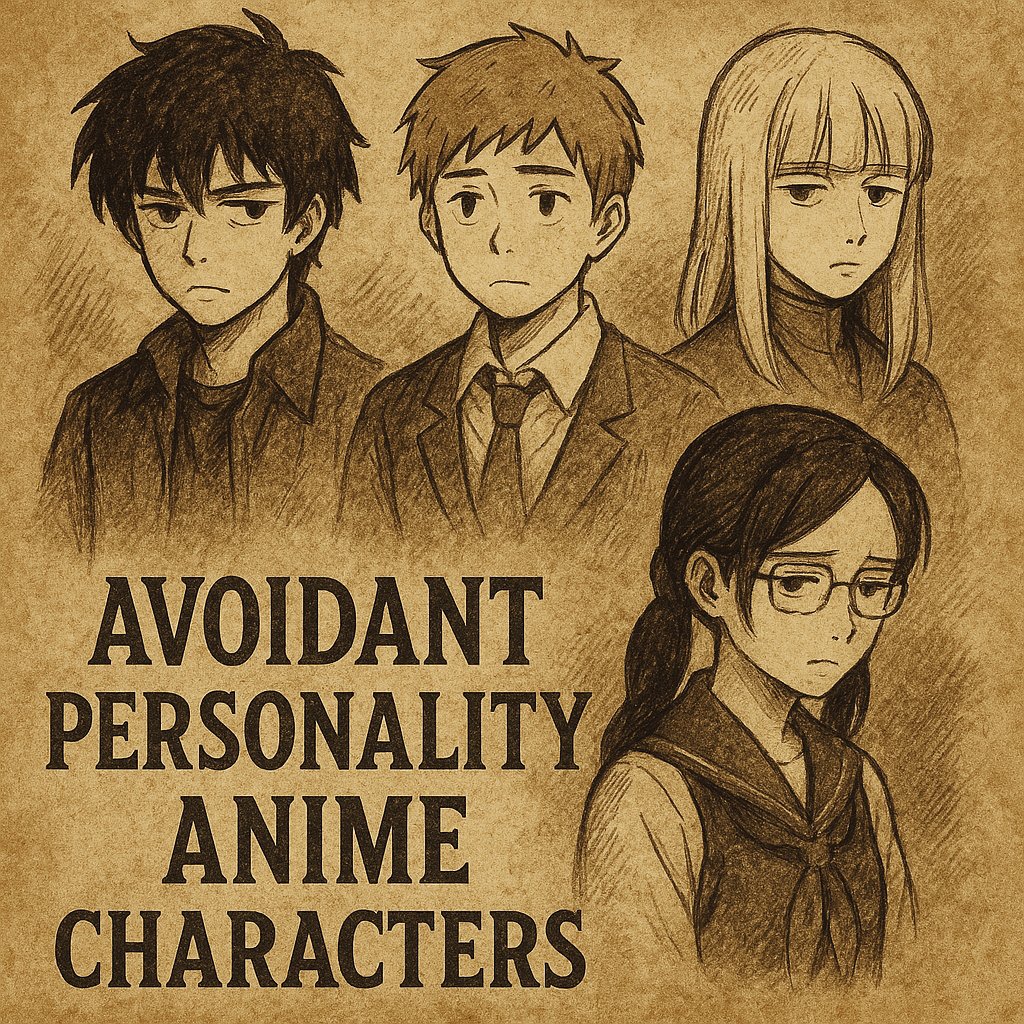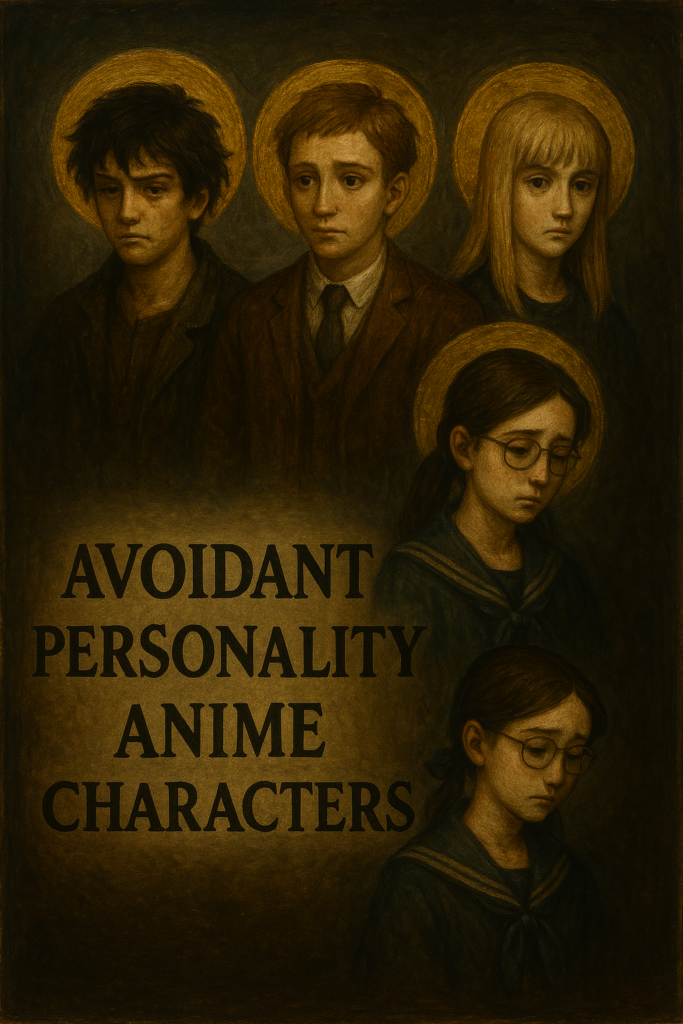Table of Contents

Avoidant Personality Anime Characters You’ll Relate To
Anime is more than just thrilling action scenes and colorful character designs — it’s a medium that often dives deep into the psychology of its characters. Among the diverse personalities portrayed in anime, one type quietly stands out for its emotional depth and realism: the avoidant personality anime characters.
These characters tend to be shy, socially withdrawn, and emotionally distant. They often battle internal struggles such as low self-esteem, fear of rejection, and social anxiety — classic traits of what’s known in psychology as an avoidant personality. While some may label them as “introverts” or “loners,” there’s a distinct difference between someone who simply enjoys solitude and someone who actively avoids relationships out of fear.
Unlike bold protagonists who take charge and demand the spotlight, avoidant characters are usually on the sidelines — hesitant, overthinking, and silently hurting. They’re not antisocial by nature, but they’ve been shaped by past experiences: bullying, trauma, neglect, or even unrealistic expectations from others. These experiences leave them afraid to open up, afraid to be seen, and afraid to be judged.
And yet, these characters resonate with so many viewers. Perhaps it’s because many people know what it’s like to feel out of place, to worry about being a burden, or to overanalyze every social interaction. Watching a character go through these same emotional hurdles — and slowly grow from them — offers a sense of catharsis and comfort.
In this post, we’ll explore a curated list of anime characters with avoidant personality traits, from emotionally withdrawn heroes to socially anxious anime protagonists who find strength in vulnerability. These aren’t just side characters — they’re quiet symbols of resilience, introspection, and emotional complexity. Whether you’re looking for relatable characters or want to better understand anime characters with social anxiety, this list will shine a light on some of anime’s most emotionally rich and psychologically realistic personalities.
For another perspective on how anime explores psychological growth, especially through character design and symbolism, check out this thoughtful breakdown of Amuro Ray’s Mobile Suit evolution. It’s a great companion read if you’re drawn to introspective characters.
What Is Avoidant Personality?
An avoidant personality is more than just being shy or quiet — it’s a deep-rooted psychological pattern marked by intense fear of rejection, low self-worth, and a tendency to withdraw from social interaction. In clinical terms, this is often referred to as Avoidant Personality Disorder (AvPD), but in the context of anime, we’re mostly looking at characters who show avoidant traits, even if they’re not “diagnosed” or labeled as such in the story.
People with avoidant tendencies may desperately want connection, but their fear of criticism and disapproval often keeps them from reaching out. They may interpret neutral feedback as harsh judgment, or believe that they’re inherently unlikable. Because of this, they avoid relationships, hide their true emotions, and often live with chronic self-doubt.
In anime, avoidant characters are usually portrayed as:
- Socially awkward or anxious
- Reluctant to speak up or express opinions
- Prone to self-isolation or emotional shutdowns
- Struggling with feelings of inadequacy
- Often misunderstood or labeled as “cold” or “weird”
What makes these characters so compelling is their emotional realism. While some anime exaggerate personalities for comedic or dramatic effect, avoidant characters often feel grounded — their behaviors mirror real human defense mechanisms.
Some may have been bullied or abandoned, while others were raised in environments where expressing emotion felt unsafe. These backstories add depth and help the audience understand why the character avoids people, why they build emotional walls, and why even simple connections can feel terrifying.
Ultimately, avoidant personality traits in anime characters offer more than just a character archetype — they present an opportunity to explore the complex psychology of vulnerability, trust, and healing. They show us that growth doesn’t always look like boldness. Sometimes, it’s a quiet decision to try again, to speak up, or to let someone in.

Top Avoidant Personality Anime Characters
Avoidant characters in anime are often quiet, reserved, and emotionally guarded — but their inner worlds are rich, and their stories often among the most touching. Here are some of the most memorable avoidant personality anime characters who left a lasting impression through their silence, struggles, and subtle growth.
Hachiman Hikigaya – My Teen Romantic Comedy SNAFU (Oregairu)
Hachiman is the textbook example of a character who protects himself through detachment and sarcasm. His world-weary, pessimistic view of human relationships isn’t just edgy commentary — it’s a defense mechanism built from years of rejection and misunderstanding. Despite longing for connection, he avoids vulnerability at all costs, even if it means sabotaging himself.
Avoidant Traits: Fear of emotional exposure, isolation, mistrust of others, emotionally repressed.
Shinji Ikari – Neon Genesis Evangelion
Shinji’s avoidance goes far beyond typical introversion. He constantly runs from responsibility, emotional conflict, and — most of all — from himself. He’s terrified of rejection and burdened by the belief that he doesn’t deserve love or kindness. His story is a raw, painful dive into how low self-esteem and social withdrawal can consume a person from the inside out.
Avoidant Traits: Self-loathing, avoidance of intimacy, emotional withdrawal, fear of abandonment.
Rei Ayanami – Neon Genesis Evangelion
Rei appears emotionless on the surface, but that’s because she doesn’t know how to express herself — or even who she really is. She’s quiet, obedient, and disconnected, not out of apathy, but because she doesn’t believe she matters. Her avoidant tendencies stem from existential confusion and a lifetime of emotional suppression.
Avoidant Traits: Emotional numbness, identity confusion, isolation, internalized neglect.
Shoya Ishida – A Silent Voice (Koe no Katachi)
After bullying a deaf girl in his youth, Shoya grows up haunted by shame and guilt. He becomes intensely avoidant, shutting himself off from others and labeling himself as irredeemable. He avoids eye contact, hides his face in public, and believes he doesn’t deserve friendship or forgiveness. His journey is a heart-wrenching example of avoidant behavior caused by trauma.
Avoidant Traits: Guilt-induced isolation, extreme fear of social judgment, withdrawal from life.
Homura Akemi – Puella Magi Madoka Magica
Homura begins as a shy, clumsy girl, but through repeated time loops and trauma, she becomes cold and withdrawn. Her stoic exterior hides a burning fear of loss and a desperate desire to protect the one person she cares about — no matter the cost. Her emotional distance and reluctance to trust reflect deep avoidant coping mechanisms.
Avoidant Traits: Suppressed emotions, fear of vulnerability, avoidance of attachment.
Komi Shouko – Komi Can’t Communicate
Komi isn’t just shy — she experiences severe communication anxiety. Despite her popularity, she struggles to speak even a few words to others. Her fear of being judged or saying the wrong thing is so strong that it affects every interaction. But through slow and steady support from her friends, she begins to open up.
Avoidant Traits: Extreme social anxiety, fear of judgment, nonverbal avoidance.
Sato Kazuma – KonoSuba
Though comedic in tone, Kazuma shows elements of avoidant behavior in how he often deflects with sarcasm, avoids taking responsibility, and fears emotional closeness. His experiences with death and rebirth also make him question the value of his own life, leading to self-deprecating humor that hides deeper issues.
Avoidant Traits: Deflective sarcasm, fear of failure, emotional detachment masked by comedy.
How Avoidant Characters Reflect Real-Life Struggles
One of the reasons avoidant personality anime characters resonate so deeply with audiences is because their struggles feel painfully real. In a world that often celebrates loud confidence and extroverted charm, those who deal with social anxiety, low self-esteem, or a fear of emotional intimacy can feel left behind — or invisible. That’s where these characters come in.
They remind us that it’s okay to be quiet. That it’s normal to overthink a text message or worry about being judged in a group setting. Through subtle storytelling and internal monologues, anime gives us a chance to step into the shoes of characters who reflect the emotional battles many people face daily — battles that are often hidden behind silence, hesitation, or an awkward smile.
For viewers who have experienced bullying, neglect, parental pressure, or mental health struggles, these characters offer validation. They aren’t just fictional personalities — they’re mirrors, showing us that emotional distance doesn’t mean emotional absence. These characters may avoid connection, but it doesn’t mean they don’t crave it. They may push others away, but often it’s because they’re terrified of being hurt, not because they don’t care.
In fact, some of the most beautiful arcs in anime belong to emotionally withdrawn characters who slowly, painfully learn to trust again. Their growth is never sudden or dramatic — it’s cautious, tentative, and deeply human. Whether it’s Rei Ayanami finally showing a flicker of emotion, or Hachiman learning to ask for help, these moments hit harder because we know how much they cost.
These characters also help us become more empathetic. By understanding the behaviors and motivations of people with avoidant traits, we become better friends, partners, and human beings. We learn that silence isn’t always disinterest. That emotional distance might be someone’s way of protecting a heart that’s already cracked.
Final Thoughts
In a medium filled with heroes, warriors, and bold adventurers, it’s the quiet, hesitant, and emotionally fragile characters who often leave the deepest impact. Avoidant personality anime characters may not always stand at the center of the action, but their personal journeys of vulnerability, fear, and growth are stories that stay with us.
Their pain is not loud, but it’s real. Their fears are not dramatic, but they shape every word left unsaid, every glance avoided, and every small step toward connection. Through them, anime reminds us that emotional strength isn’t just about fighting back — sometimes, it’s about not giving up on yourself, even when it’s hard to face the world.
If you’ve ever felt like you didn’t fit in, feared being judged, or struggled to let others in — these characters are for you. They show that even the most withdrawn hearts can heal, change, and love in their own way.
What About You?
Do you have a favorite avoidant anime character who helped you feel seen?
Let us know in the comments!
And if you found this article helpful, consider sharing it with fellow anime fans who love character-driven storytelling.
1. 🧠 Personality Disorders 101: Avoidant Personality Disorder (AVPD)
This blog post provides a clear psychological overview of Avoidant Personality Disorder, including its symptoms and emotional impact. Although not anime-specific, it’s a helpful foundation for understanding characters like Shinji Ikari from Neon Genesis Evangelion.
“People with AVPD often feel socially inadequate, are extremely sensitive to negative evaluation, and avoid social interaction despite craving connection.”
2. 🎸 10 Anime Characters Who Struggle with Anxiety – Sportskeeda
This article lists various anime characters who display anxiety and social withdrawal, including Hitori Gotoh from Bocchi the Rock! and Shoko Komi from Komi Can’t Communicate. It’s a great pop-culture-oriented breakdown of anxiety-related traits in anime.
3. 📺 Shinji Ikari and the Psychology of Avoidance
While Evangelion has been analyzed countless times, this piece specifically ties Shinji’s avoidant behavior to psychological concepts, making it a must-read for those who want to understand the depth behind his actions.